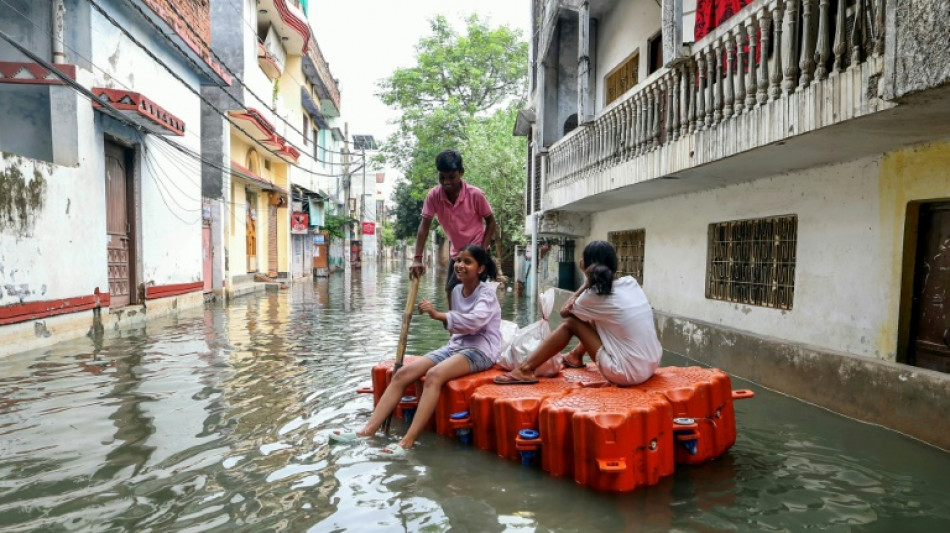
-
 'Everything was removed': Gambians share pain with FGM ban in balance
'Everything was removed': Gambians share pain with FGM ban in balance
-
Kim Jong Un opens rare party congress in North Korea

-
 Ex-Philippine leader Duterte faces pre-trial ICC hearing
Ex-Philippine leader Duterte faces pre-trial ICC hearing
-
Japanese star Sakamoto 'frustrated' at missing Olympic skating gold

-
 Japan inflation eases in welcome news for Takaichi
Japan inflation eases in welcome news for Takaichi
-
FIFA to lead $75m Palestinian soccer rebuilding fund

-
 Chicago Bears take key step in proposed Indiana stadium move
Chicago Bears take key step in proposed Indiana stadium move
-
Liu captures Olympic figure skating gold as US seal hockey glory

-
 North Korea opens key party congress
North Korea opens key party congress
-
Los Angeles sues Roblox over child exploitation claim

-
 Golden Liu puts US women back on top of Olympic women's figure skating
Golden Liu puts US women back on top of Olympic women's figure skating
-
Hodgkinson sets women's 800m world indoor record

-
 USA's Alysa Liu wins Olympic women's figure skating gold
USA's Alysa Liu wins Olympic women's figure skating gold
-
Man Utd cruise into Women's Champions League quarters

-
 Gu reaches Olympic halfpipe final after horror crash mars qualifiers
Gu reaches Olympic halfpipe final after horror crash mars qualifiers
-
Keller overtime strike gives USA Olympic women's ice hockey gold

-
 NASA delivers harsh assessment of botched Boeing Starliner test flight
NASA delivers harsh assessment of botched Boeing Starliner test flight
-
US Fed Governor Miran scales back call for rate cuts this year

-
 Gu qualifies for Olympic halfpipe final marred by horror crash
Gu qualifies for Olympic halfpipe final marred by horror crash
-
Trump issues Iran with ultimatum as US ramps up military presence

-
 Peru's brand-new president under fire for child sex comments
Peru's brand-new president under fire for child sex comments
-
UK police hold ex-prince Andrew for hours in unprecedented blow

-
 Former Olympic freeski halfpipe champion Sharpe crashes heavily
Former Olympic freeski halfpipe champion Sharpe crashes heavily
-
Former Olympic champion Sharpe suffers heavy halfpipe crash

-
 Belarus says US failed to issue visas for 'Board of Peace' meeting
Belarus says US failed to issue visas for 'Board of Peace' meeting
-
Forest boss Pereira makes perfect start with Fenerbahce rout in Europa play-offs

-
 Alcaraz fights back to book last four berth in Qatar
Alcaraz fights back to book last four berth in Qatar
-
England captain Itoje warns of 'corrosive' social media after abuse of Ireland's Edogbo

-
 War-weary Sudanese celebrate as Ramadan returns to Khartoum
War-weary Sudanese celebrate as Ramadan returns to Khartoum
-
Townsend expects recalled Scotland duo to shine in Six Nations clash with Wales

-
 Peru's new president under fire for child sex comments
Peru's new president under fire for child sex comments
-
UK king opens London fashion week despite brother's arrest

-
 Belarus frees opposition politician Statkevich
Belarus frees opposition politician Statkevich
-
Striking Argentine workers slow down Buenos Aires in protest over labor reforms
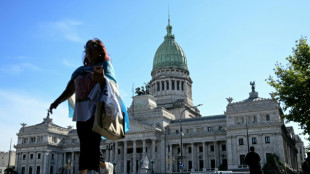
-
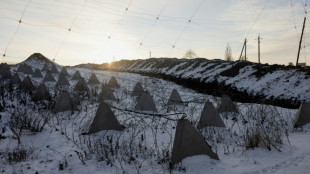 Starlink loss a blow to Russian forces in Ukraine: experts
Starlink loss a blow to Russian forces in Ukraine: experts
-
UN's Sudan probe finds 'hallmarks of genocide' in El-Fasher
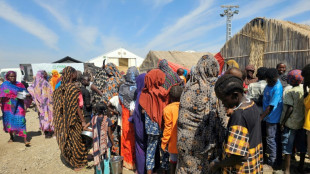
-
 Belarus frees opposition politician Statkevich: wife
Belarus frees opposition politician Statkevich: wife
-
Rocket re-entry pollution measured in atmosphere for first time

-
 Airbus ready to build two new European fighters if countries want
Airbus ready to build two new European fighters if countries want
-
Canada makes push to attract skilled migrants, including for defence

-
 US threatens to leave IEA if net zero focus remains
US threatens to leave IEA if net zero focus remains
-
Walmart outlines big AI ambitions as it reports mixed results

-
 Trump kicks off his 'Board of Peace,' as war clouds loom on Iran
Trump kicks off his 'Board of Peace,' as war clouds loom on Iran
-
UK pubs to stay open late if home nations reach World Cup knockouts

-
 TotalEnergies in high-stakes French trial over climate change
TotalEnergies in high-stakes French trial over climate change
-
Bosnia probes fascist salutes at Croatian singer's concert

-
 US and Israel issue dire warnings to Iran alongside US military buildup
US and Israel issue dire warnings to Iran alongside US military buildup
-
British public cheer Andrew's arrest with a smile and relief

-
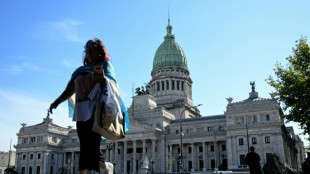 Argentine workers go on strike to protest Milei's labor reforms
Argentine workers go on strike to protest Milei's labor reforms
-
Nakai targets Olympic skating upset as 'skimo' makes debut


Third-hottest July on record wreaks climate havoc
The third-hottest July worldwide ended a string of record-breaking temperatures, but many regions were devastated by extreme weather amplified by global warming, the European climate monitoring service said Thursday.
Heavy rains flooded Pakistan and northern China; Canada, Scotland and Greece struggled to tame wildfires intensified by persistent drought; and many nations in Asia and Scandinavia recorded new average highs for the month.
"Two years after the hottest July on record, the recent streak of global temperature records is over," Carlo Buontempo, director of the EU's Copernicus Climate Change Service, said in a statement.
"But that does not mean climate change has stopped," he said. "We continue to witness the effects of a warming world."
- A misleading dip -
As in June, July showed a slight dip compared to the preceding two years, averaging 1.25 degrees Celsius above the pre-industrial (1850-1900) era.
2023 and 2024 warmed above that benchmark by more than 1.5C, which is the Paris Agreement target set in 2015 for capping the rise in global temperatures at relatively safe levels.
That deceptively small increase has been enough to make storms, heatwaves and other extreme weather events far more deadly and destructive.
"We continued to witness the effect of a warming world in events such as extreme heatwaves and catastrophic floods in July," Buontempo said.
Last month, temperatures exceeded 50C in the Gulf, Iraq and -- for the first time -- Turkey, while torrential rains killed hundreds of people in China and Pakistan.
In Spain, more than a thousand deaths were attributed by a public institute to the heat in July, half as many as in the same period in 2024.
The main source of the CO2 driving up temperatures is well known: the burning of oil, coal and gas to generate energy.
"Unless we rapidly stabilise greenhouse gas concentrations in the atmosphere, we should expect not only new temperature records but also a worsening of impacts," Buontempo said.
- Regional contrasts -
Global average temperatures are calculated using billions of satellite and weather readings, both on land and at sea, and the data used by Copernicus extends back to 1940.
Even if July was milder in some places than in previous years, 11 countries experienced their hottest July in at least a half-century, including China, Japan, North Korea, Tajikistan, Bhutan, Brunei and Malaysia, according to AFP calculations.
In Europe, Nordic countries saw an unprecedented string of hot days, including more than 20 days above 30C across Finland.
More than half of the land in Europe and along the Mediterranean basin experienced the worst drought conditions in the first three weeks of July since monitoring began in 2012, according to an AFP analysis of data from the European Drought Observatory (EDO).
In contrast, temperatures were below normal in North and South America, India and parts of Australia and Africa, as well as in Antarctica.
- Seas still overheating -
Last month was also the third-hottest July on record for sea surface temperatures.
Locally, however, several ocean records for July were broken: in the Norwegian Sea, in parts of the North Sea, in the North Atlantic west of France and Britain.
The extent of Arctic sea ice was 10 percent below average, the second lowest for a July in 47 years of satellite observations, virtually tied with the readings of 2012 and 2021.
Diminishing sea ice is a concern not because it adds to sea levels, but because it replaces the snow and ice that reflect almost all the Sun's energy back into space with deep blue ocean, which absorbs it.
Ninety percent of the excess heat generated by global warming is absorbed by the oceans.
In Antarctica, sea ice extent is the third lowest on record for this month.
- 'Records to be broken' -
"Human activities are causing the world to warm at an unprecedented rate," Piers Forster, Director of the Priestley Centre for Climate Futures at the University of Leeds, told AFP in commenting on the new data.
On top of the human-driven warming, he explained, there are year-to-year changes caused by natural phenomena, such as the El Nino -- a shift in wind patterns across the southern Pacific -- and volcanic activity that helped push global temperatures past the 1.5C threshold over the last two years.
"These variations are now reducing, dropping us back from the record-breaking temperatures," said Forster, who heads a consortium of 60 top scientists that track core changes in Earth's climate system.
"But the reprieve is only temporary," he added. "We can expect the the high records to be broken again in the near future."
F.Dubois--AMWN


